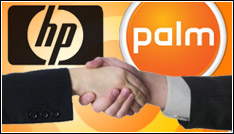Palm Boss Talks WebOS Tablet And Smartphones

The HP executive in charge of the Palm division is hoping to impress next year with the new WebOS tablet and new smartphones
The head of Hewlett-Packard’s Palm division, Jon Rubinstein, offered the audience at the San Francisco D:Dive Into Mobile a glimpse into the inner workings behind the HP and Palm brands and its future roadmaps.
Rubinstein – the CEO of Palm before it was purchased by HP this summer, and the man who spearheaded the company’s Palm Pre and WebOS efforts – did confirm that the Palm tablet running a version WebOS will come to market in 2011, but the industry has been expecting such a device for some time now.
Since being acquired by HP, the only new product to emerge has been the Palm Pre 2 – a smartphone that, while running an updated version of the well-liked WebOS platform, aroused little excitement from consumers, as it didn’t seem to depart very much (in appearance, anyway) from the original Pre or Pre Plus.
Radically Different Devices

According to the Inquirer, Rubinstein took the stage in a “fighting mood,” and said that in the next 12 months, HP will launch several “radically different devices,” including the tablet and several smartphones. The Pre 2, it was implied, shouldn’t be taken as the team’s best effort.
“This is just the beginning,” he said, according to the Associated Press. “It’s not ‘game over.’”
Rubinstein also offered details on the acquisition, saying that while six companies showed serious interest in Palm, HP was the right choice, both because it was the largest computer company in the world and could give Palm’s products more traction, and because it was eager to break into the mobile phone market but lacked a mobile strategy.
Of Palm’s failure to find traction over the years – as it was acquired and then acquired again – or substantial success with the original Palm Pre, which debutted within days of the Apple iPhone 3GS, Rubinstein acknowledged that Palm’s competitors moved faster than it could keep pace with.
“We ran out of runway,” he said, according to AP.
Looking Forward
Looking forward, however, Rubinstein described new HP CEO Leo Apotheker as being “really jazzed” about WebOS and its potential. Apotheker assumed the role 1 November following the abrupt (some said too abrupt) resignation of Mark Hurd, who found himself tangled in a sexual harassment scandal with a former HP contractor.
Rubinstein also told the audience that there’s ongoing talk about whether to carry on the Palm name, or to brand the new products under HP. A pioneer in the handheld space before losing its footing – or rather “runway,” as Rubinstein earlier described it – Palm is still associated, by many, with the Palm Pilot, one of the first PDAs, or personal digital assistants.
“It does have some strengths as far as brand recognition. It also has some negative connotations around it as well,” Rubinstein said, according to AP. “At the end of the day, HP needs to build a brand around what it’s going to do going forward, and WebOS is one of those key elements.”